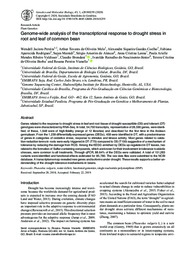Genome-wide analysis of the transcriptional response to drought stress in root and leaf of common bean.
Genome-wide analysis of the transcriptional response to drought stress in root and leaf of common bean.
Author(s): PEREIRA, W. J.; MELO, A. T. de O.; COELHO, A. S. G.; RODRIGUES, F. A.; MAMIDI, S.; ALENCAR, S. A. de; LANNA, A. C.; VALDISSER, P. A. M. R.; BRONDANI, C.; NASCIMENTO JUNIOR, I. R. do; BORBA, T. C. de O.; VIANELLO, R. P.
Summary: Genes related to the response to drought stress in leaf and root tissue of drought-susceptible (DS) and tolerant (DT) genotypes were characterized by RNA-Seq. In total, 54,750 transcripts, representative of 28,590 genes, were identified; of these, 1,648 were of high-fidelity (merge of 12 libraries) and described for the first time in the Andean germplasm. From the 1,239 differentially expressed genes (DEGs), 458 were identified in DT, with a predominance of genes in categories of oxidative stress, response to stimulus and kinase activity. Most genes related to oxidation-reduction terms in roots were early triggered in DT (T75) compared to DS (T150) suggestive of a mechanism of tolerance by reducing the damage from ROS. Among the KEGG enriched by DEGs up-regulated in DT leaves, two related to the formation of Sulfur-containing compounds, which are known for their involvement in tolerance to abiotic stresses, were common to all treatments. Through qPCR, 88.64% of the DEGs were validated. A total of 151,283 variants were identified and functional effects estimated for 85,780. The raw data files were submitted to the NCBI database. A transcriptome map revealed new genes and isoforms under drought. These results supports a better understanding of the drought tolerance mechanisms in beans.
Publication year: 2020
Types of publication: Journal article
Unit: Embrapa Rice & Beans
Observation
Some of Embrapa's publications are published as ePub files. To read them, use or download one of the following free software options to your computer or mobile device. Android: Google Play Books; IOS: iBooks; Windows and Linux: Calibre.
Access other publications
Access the Agricultural Research Database (BDPA) to consult Embrapa's full library collection and records.
Visit Embrapa Bookstore to purchase books and other publications sold by Embrapa.

